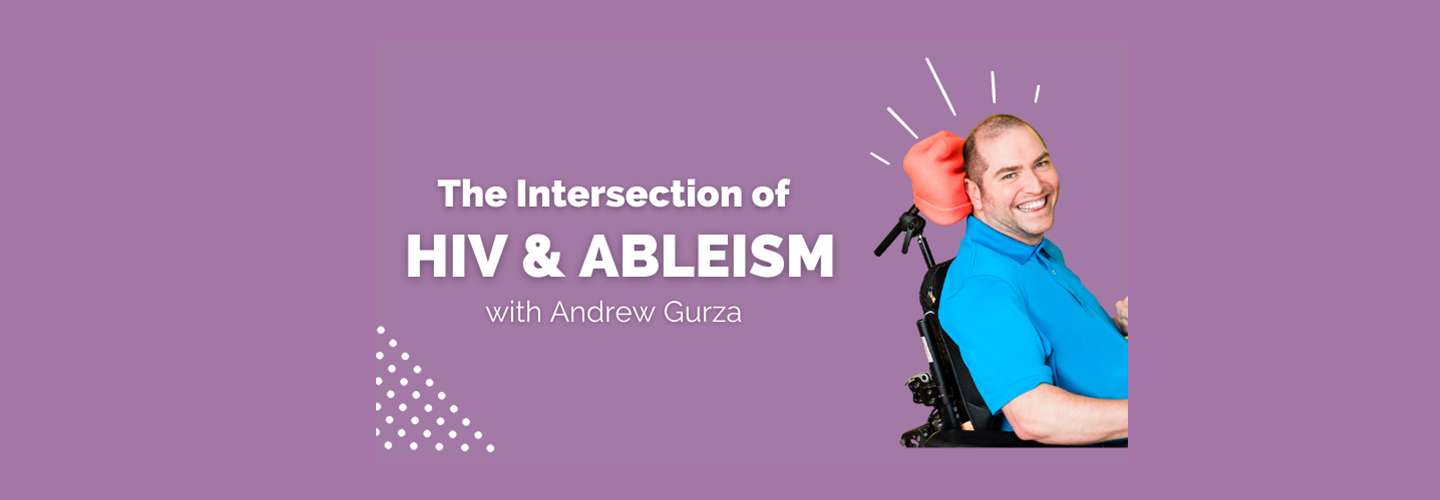With Guest Blogger Andrew Gurza
Andrew Gurza is a queer disability advocate, podcaster, and writer, primarily focusing on the intersection of disability and sex. Most recently, Andrew was a Technical Consultant for the Queer As Folk reboot. This helps ensure the fair representation and portrayal of disabled folks.
Let’s hear from Andrew on the undeniable link that ableism and HIV discrimination share and how the LGBTQ+ community can learn and do better.
HIV Stigma and Disability
There is so much stigma attached to people living with HIV in the LGBTQ+ community. Go on any queer male dating app, and within a few minutes you’re bound to encounter someone saying that they are “clean.” Or proudly boasting that, while they may be HIV-positive, they are also “undetectable.”
We barely notice this language because people use it so freely. Even as we pursue dates, sex, and relationships in 2022.
But, for me, as a disabled queer person who uses a wheelchair, I look at the language we use to talk about HIV, and I can’t help but notice that the ways in which a lot of queer people discuss it is rooted in ableism.
What is Ableism and How Do People Living with HIV Experience It?
First, let’s quickly understand what ableism is.
The easiest definition of ableism is the discrimination in favor of able-bodied people. Of course, people can weaponize many types of ableism against chronically ill and disabled folks. Jokes about their ability levels to jokes about whether they can have sex, to lack of access to sex because of this discrimination, and so much more.
When I traverse the apps looking for love, lust, and everything in between, it is almost inevitable that I will encounter some variation of these ableist comments.
HIV is widely becoming understood as an episodic disability or chronic illness by many states and health systems. I believe that when we make comments about or avoid people with HIV due to their status, we are engaging an “othering.” People with other disabilities, whose disability may be more visible, have understood all that othering too well.
Every time I see a young person with HIV get discriminated against, I want to scream, “WHAT THEY DID TO YOU WAS ABLEISM!”
I want to hug them and tell them I understand what that type of bodily rejection over something you can’t change feels like. It cuts to my core to know that I’ll never be hot enough because of my status as a wheelchair user, and I am sure the ableism over HIV stings just as much.
Ableism and Disclosure
One of the other ways that HIV stigma is rooted in ableism is in the practice of disclosure.
I can’t even count the number of times I’ve worried about how to disclose just how disabled I am to a potential date. Then comes the absolute dread I felt in between telling them and their reaction.
I believe that people living with HIV experience that same apprehension and palpable fear. If a disabled person exposes their disability, there is a chance of rejection as a result. That is scary.
One of the reasons we have seen a surge in the use of “undetectable” verbiage is, in part, I believe, because of a fear of disclosure. By saying, “I’m undetectable” rather than “I’m HIV-positive,” people living with HIV are reminding prospective partners that they are not a threat.
As a wheelchair user, I have made similar overtures to put a new bedfellow at ease: “I’m a wheelchair-user” rather than “I’m disabled” – finding anything that I could to ease their fears and be accepted.
How Can We Help Change This?
One of the ways that we can work on dismantling the ableism against HIV positive people is teaching the queer community what ableism is. And letting them know that they are affected by it, too.
I think we also need to give queer people who have issues with HIV a chance to explore their ableist behavior, but without shame or derision.
Once we start talking about ableism and its linkage to HIV, we can start understanding how to stop it.
Once we do that, maybe our ableist behavior will be undetectable too.
Learn More
Learn more about HIV, sexual wellness, inclusivity, intersectionality, and more at qcareplus.com. Q Care Plus serves people from all backgrounds and provides accessibility around PrEP (pre-exposure prophylaxis) to help prevent HIV.
Create a profile and continue learning on our blog!
